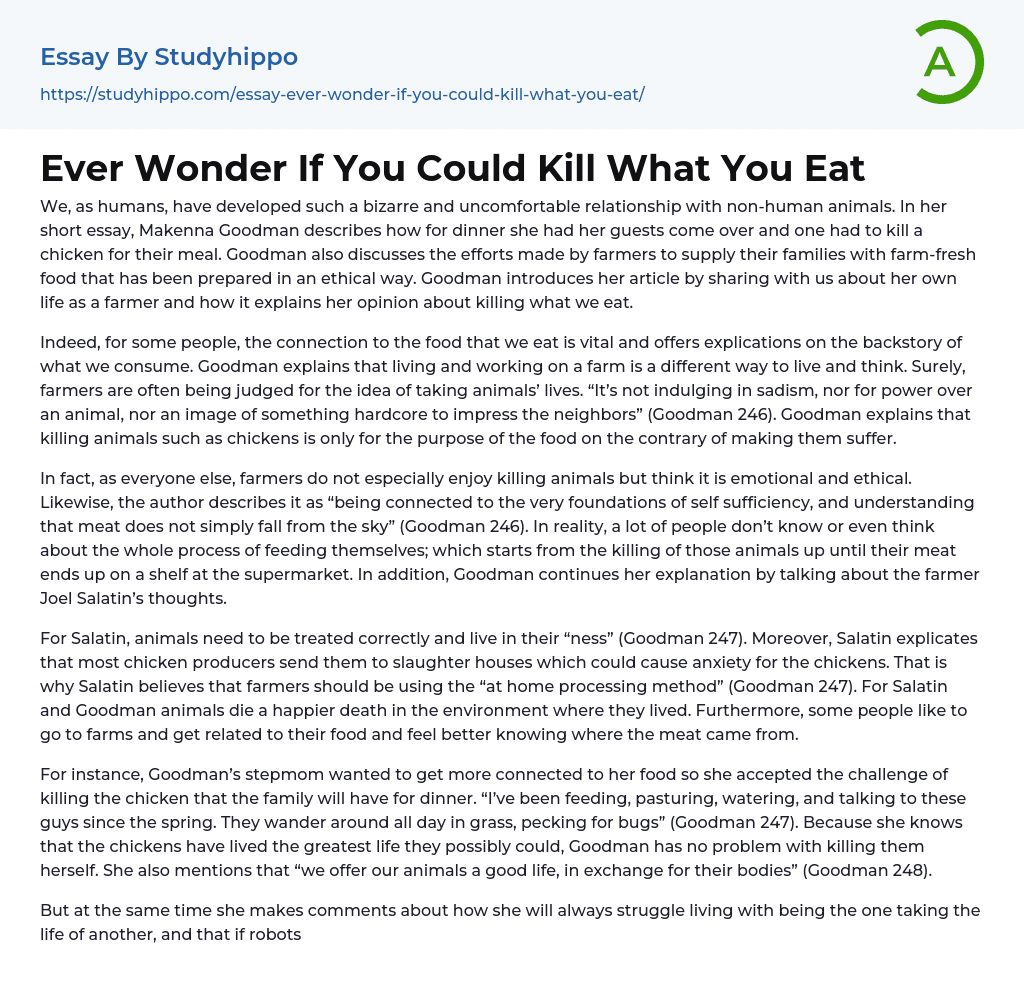We, as humans, have developed such a bizarre and uncomfortable relationship with non-human animals. In her short essay, Makenna Goodman describes how for dinner she had her guests come over and one had to kill a chicken for their meal. Goodman also discusses the efforts made by farmers to supply their families with farm-fresh food that has been prepared in an ethical way. Goodman introduces her article by sharing with us about her own life as a farmer and how it explains her opinion about killing what we eat.
Indeed, for some people, the connection to the food that we eat is vital and offers explications on the backstory of what we consume. Goodman explains that living and working on a farm is a different way to live and think. Surely, farmers are often being judged for the idea of taking anima
...ls’ lives. “It’s not indulging in sadism, nor for power over an animal, nor an image of something hardcore to impress the neighbors” (Goodman 246). Goodman explains that killing animals such as chickens is only for the purpose of the food on the contrary of making them suffer.
In fact, as everyone else, farmers do not especially enjoy killing animals but think it is emotional and ethical. Likewise, the author describes it as “being connected to the very foundations of self sufficiency, and understanding that meat does not simply fall from the sky” (Goodman 246). In reality, a lot of people don’t know or even think about the whole process of feeding themselves; which starts from the killing of those animals up until their meat ends up on a shelf at the supermarket. In addition, Goodma
continues her explanation by talking about the farmer Joel Salatin’s thoughts.
For Salatin, animals need to be treated correctly and live in their “ness” (Goodman 247). Moreover, Salatin explicates that most chicken producers send them to slaughter houses which could cause anxiety for the chickens. That is why Salatin believes that farmers should be using the “at home processing method” (Goodman 247). For Salatin and Goodman animals die a happier death in the environment where they lived. Furthermore, some people like to go to farms and get related to their food and feel better knowing where the meat came from.
For instance, Goodman’s stepmom wanted to get more connected to her food so she accepted the challenge of killing the chicken that the family will have for dinner. “I’ve been feeding, pasturing, watering, and talking to these guys since the spring. They wander around all day in grass, pecking for bugs” (Goodman 247). Because she knows that the chickens have lived the greatest life they possibly could, Goodman has no problem with killing them herself. She also mentions that “we offer our animals a good life, in exchange for their bodies” (Goodman 248).
But at the same time she makes comments about how she will always struggle living with being the one taking the life of another, and that if robots came and farmed us like she farms chickens she probably wouldn’t be too happy about it. Goodman tells us that since moving to a farm, the food labels don’t interest her any longer. ” Foodie labels don’t excite me anymore. Give me the backstory” (Goodman 248). According to Goodman, knowing how and where the animal lived is
more important than whether or not the meat is labeled ”organic”, “local”, or “farm fresh”.
For all we know the local animal could have been raised in a cage or the organic animal could have been fed with feed instead of grass. Makenna Goodman makes a very good point in this short essay in regards to growing your own produce and raising your own food. Farmers raise their own animals because they don’t want to be part of the industrialized agricultural machine that routinely abuses animals based solely on dollar signs and greed. Contrarily, farmers take really good care of their animals and are taking a step toward helping the environment by avoiding the purchase of mass-produced meat and produce.
- Adaptation essays
- Adventure essays
- Adversity essays
- Aging essays
- Alcohol essays
- Barbie Doll essays
- Beauty essays
- Care essays
- Carpe diem essays
- Change essays
- Chess essays
- Chicken essays
- Choices essays
- Contrast essays
- Crops essays
- Development essays
- Dream essays
- Evil essays
- Experience essays
- Family essays
- Farm essays
- Fire essays
- First Love essays
- Focus essays
- Greed essays
- Hero essays
- Holiday essays
- House essays
- Housing essays
- Humility essays
- Humor essays
- Hypocrisy essays
- Integrity essays
- Law of Life essays
- Life Changing Experience essays
- Life Experience essays
- Lifestyle essays
- Limitations essays
- Love Story essays
- Mother Tongue essays
- Motherhood essays
- My Neighborhood essays
- Myself essays
- Mystery essays
- Narcissism essays
- Never Give Up essays
- Nursing essays
- Object essays
- Opportunity essays
- Peel essays




